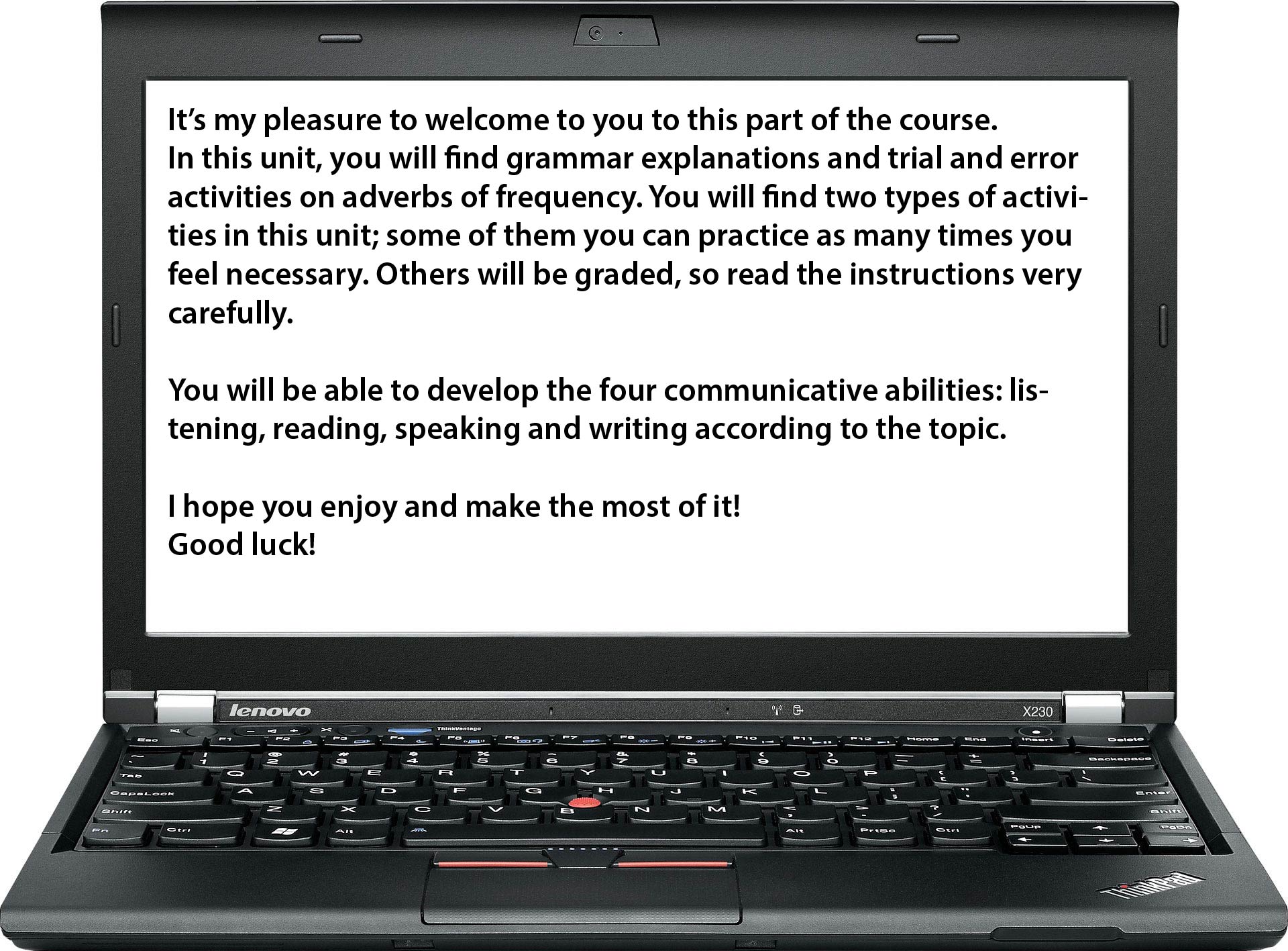
Sarinharas. (2016). Portable Computer Computer Pc Informatics Thinkpad [image]. Retrieved on 2017, April 24 from https://pixabay.com/photo-1155173/
By the end of this topic you will:
Reproduce the adverbs of frequency by answering the question “how often?” Or by saying how regularly something happens or someone performs a specific daily activity.

Altmann, G. (2017). Question Mark Note Request Matter Requests [illustration]. Retrieved on 2017,
April 24 from https://pixabay.com/photo-2153514/
Can you answer this question?
Adverbs of frequency are useful to describe how often actions happen. Use the following forms:
• Before a main verb (except with To Be)
Subject + adverb + main verb
I always remember to do my homework
He normally gets good marks in his exams
• After the verb To Be.
Subject + to be +adverb
They are never pleased to see me
She isn’t usually bad tempered
• We can also use the following adverbs at the start of a sentence.
Usually, normally, often, frequently, sometimes, occasionally
Occasionally, I like to eat Thai food
• We cannot use the following at the beginning of a sentence.
Always, seldom, rarely, hardly, ever, never
• We use hardly ever and never with positive, not negative verbs.
She hardly ever comes to my parties
They never say 'thank you'
• We can also use the following expressions when we want to be more specific about the frequency.
- every day - once a month - twice a year - four times a day - every other week
Easy, right?
Can you identify which adverb of frequency is used to describe how often you do a specific action in your daily life?
Look at the following images and think of sentences to answer the questions. Don't forget their correct word order.
Exercise 1
NOW IT’S YOUR TURN to practice adverbs of frequency. Type your answer in the table below using, always, usually, sometimes, hardly ever, or never and the correct form. If you have questions, go back to the grammar explanation to remember how to express How often do you…?
Once you’re finished, save your activity and keep practicing with this type of exercises.
Exercise 2
In this exercise, you will begin to put into practice the use of adverbs of frequency to describe daily activities. You can do it as many times as necessary.
BE CAREFUL !
|
COMMON LEARNER ERRORS |
EXPLANATION |
|---|---|
We usually are are usually the first students to arrive. |
Adverbs of frequency usually come after the verb be. |
It takes usually usually takes me only 15 minutes to arrive at work. |
Adverbs of frequency usually come before the verbs (other than be). |
The price of electricity never has been has never been as high as it is now. |
When a verb has two parts (is using, has used), adverbs of frequency usually come between the two parts. |
I don’t never never text while driving. |
Double negatives are not possible. |
Exercise 3

Ernie. (2003). Tawny Owl Owl Bird Birds Night Active [photo]. Retrieved on 2017, April 24 from https://pixabay.com/photo-175969/
Listen to Tina’s friend talking about her activities. Pay special attention to how often they occur. Then answer the exercise. You can do it as many times as necessary.
Activity 1
You will read a passage about the daily activities of a person who seems to be very busy all day. How busy are you in the day? Do you have a specific routine?
Pay attention to the use of the adverbs of frequency in the story. Then go to the evaluation activity to identify how much you master their use. Remember that you can go back to the content section if you have any questions.

Th5th. (2016). Breakfast Oats Healthy Food Diet Fruit Bowl Milk [photo]. Retrieved on 2017, April 25 from https://pixabay.com/photo-1663295/
Activity 2
Although every day we try to set a routine for our activities, there are always situations that are beyond our control.
For example, listen to a student giving excuses to her teacher for being late for class. Pay attention to the frequency adverbs that she uses. Then answer the activity to find out if you can identify them.
Have you been in a similar situation?

Altmann, G. (2013). Time Clock Legs Race Run Escape Direction [illustration]. Retrieved on 2017, April 25 from https://pixabay.com/photo-92897/
Activity 3
Now you're going to listen to a conversation between John and his teacher about John’s household chores. Pay attention to the frequency adverbs that they use and then answer the activity.

Boyd, k. (2015) Shower Water Wet Bathroom Stream Wash Pouring. Retrieved on 2017, April 25 from https://pixabay.com/photo-653671/
Activity 4

Altmann, G. (2017). Things Together Communication Internet [illustration]. Retrieved on 2017, April 25 from https://pixabay.com/photo-2154705/
It is time for you to put into practice the adverbs of frequency based on your daily life. How often do you do these activities?
Write about activities you practice and their frequency. Use always, never, usually, often, sometimes and other adverbs to describe your activities the best you can.
Include the time you wake up, take a shower, leave your house, study, sports, free time, etc. Include at least 10 activities. You can write your answers in the downloadable file and don't forget to check the rubric to comply with all the requirements.
Activity 5

DirtyOpi. (2015). Hand Robot Machine Artificial Intelligence [illustration]. Retrieved on 2017, April 25 from https://pixabay.com/photo-697264/
Now it’s your turn to speak!
An interviewer is asking you some questions. Please read them carefully and answer only 5 of your choice.
Remember to use the frequency adverbs in each one.
You can write your answers on this site to listen and practice the correct pronunciation before recording. Review the instructions to get the most out of it.
Do not record the questions only your answers. Use the rubrics to guide you for an excellent speech.
Once you are ready, record your voice here.
For additional practice, here two more exercises about the frequency adverbs.
You can continue practising using the references given at the end of the section.
Drag the words and order the sentence correctly. Once you have finished, you can check your score.
Choose the best option for the following statements. Once you have finished, you can check your score.

Congratulations, you have arrived at the end of the unit. Remember that you can continue practising using the complementary sites suggested at the end of the lesson.
Unsplash(2015) Hiking Mountain Climbing Mountain Walk Trekking. Retrieved on 2017, May 18 from https://pixabay.com/photo-1031628/
• British Council (2017). Adverbs of frequency. Retrieved on 2017, April 25 from https://learnenglishkids.britishcouncil.org/en/grammar-practice/adverbs-frequency
• Woodward English (2017). Adverbs of Frequency - Word Order. Retrieved on 2017, April 25 from https://www.grammar.cl/Games/Adverbs_of_Frequency.htm
•Learn English with Teacher Joe! (2017). How often? Using Never, Rarely, Sometimes, Often and Always. Retrieved on 2017, April 25 from
https://teacherjoe.us/Learn_English_Grammar04.html
• My English Pages (2017). Grammar Exercises - Adverbs of frequency. Retrieved on 2017, April 25 from
https://www.myenglishpages.com/site_php_files/grammar-exercise-adverbs-frequency.php